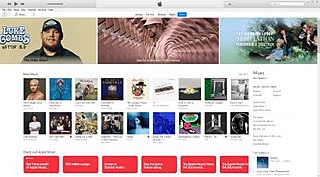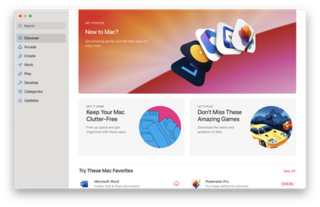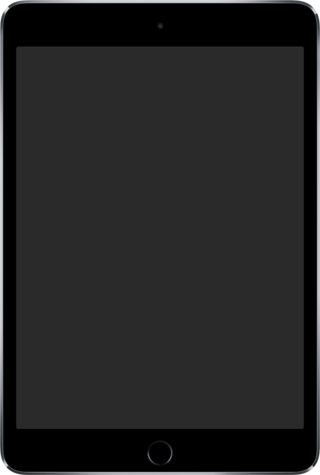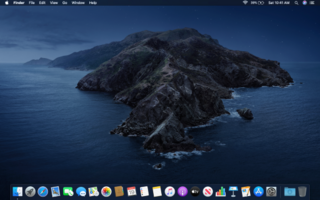Apple Store can refer to several retail operations of Apple Inc.:

The iTunes Store is a digital media store operated by Apple Inc. which opened on April 28, 2003. As of April 2020, iTunes offered 60 million songs, 2.2 million apps, 25,000 TV shows, and 65,000 films. The iTunes Store is available on most home and portable Apple devices, as well as some platforms by other companies. The store opened as part of then-CEO Steve Jobs' push to open a digital marketplace for music; when it opened, it was the only legal digital catalog of music to offer songs from all five major record labels, which played a part in its success and influence in the music downloading business. While initially a dominant player in digital media, by the mid-2010s, streaming media services were generating more revenue than the buy-to-own model used by the iTunes Store; Apple now operates its own subscription-based streaming music service, Apple Music, alongside the iTunes Store.
iPhoto is a discontinued digital photograph manipulation software application developed by Apple Inc. It was included with every Mac computer from 2002 to 2015, when it was replaced with Apple's Photos application. Originally sold as part of the iLife suite of digital media management applications, iPhoto is able to import, organize, edit, print and share digital photos.

Xcode is Apple's integrated development environment (IDE) for macOS, used to develop software for macOS, iOS, iPadOS, watchOS, tvOS, and visionOS. It was initially released in late 2003; the latest stable release is version 16, released on September 16, 2024, and is available free of charge via the Mac App Store and the Apple Developer website. Registered developers can also download preview releases and prior versions of the suite through the Apple Developer website. Xcode includes command-line tools that enable UNIX-style development via the Terminal app in macOS. They can also be downloaded and installed without the GUI.
Apple Developer is Apple Inc.'s website for software development tools, application programming interfaces (APIs), and technical resources. It contains resources to help software developers write software for the macOS, iOS, iPadOS, watchOS, tvOS and visionOS platforms.

iOS is a mobile operating system developed by Apple exclusively for its smartphones. It was unveiled in January 2007 for the first-generation iPhone, which launched in June 2007. Major versions of iOS are released annually; the current stable version, iOS 18, was released to the public on September 16, 2024.

Apple Books is an e-book reading and store application by Apple Inc. for its iOS, iPadOS and macOS operating systems and devices. It was announced, under the name iBooks, in conjunction with the iPad on January 27, 2010, and was released for the iPhone and iPod Touch in mid-2010, as part of the iOS 4 update. Initially, iBooks was not pre-loaded onto iOS devices, but users could install it free of charge from the iTunes App Store. With the release of iOS 8, it became an integrated app. On June 10, 2013, at the Apple Worldwide Developers Conference, Craig Federighi announced that iBooks would also be provided with OS X Mavericks in Fall 2013.
Game Center is a service by Apple that allows users to play and challenge friends when playing online multiplayer social gaming network games. Games can share multiplayer functionality between the Mac and iOS versions of the app.

OS X Lion, also known as Mac OS X Lion, is the eighth major release of macOS, Apple's desktop and server operating system for Mac computers.

The Mac App Store is a digital distribution platform for macOS apps, often referred to as Mac apps, created and maintained by Apple Inc. The platform was announced on October 20, 2010, at Apple's "Back to the Mac" event. Apple began accepting app submissions from registered developers on November 3, 2010, in preparation for its launch.
The following outline of Apple Inc. is a topical guide to the products, history, retail stores, corporate acquisitions, and personnel under the purview of the American multinational corporation:
The iPad Mini is a line of small tablet computers developed and marketed by Apple Inc. It is a sub-series of the iPad line of tablets, with screen sizes of 7.9 inches and 8.3 inches. The first-generation iPad Mini was announced on October 23, 2012, and was released on November 2, 2012, in nearly all of Apple's markets. It featured similar internal specifications to the iPad 2, including its display resolution.

The first-generation iPad is a tablet computer designed and marketed by Apple Inc. as the first device in the iPad lineup of tablet computers. It features an Apple A4 SoC, a 9.7 in (250 mm) touchscreen display, and, on certain variants, the capability of accessing cellular networks. Using the iOS operating system, the iPad can play music, send and receive emails and browse the web. Other functions, which include the ability to play games and access references, GPS navigation software and social network services, can be enabled by downloading apps.

The iPad Air 2 is the second-generation iPad Air tablet computer developed and marketed by Apple Inc. It was announced on October 16, 2014, alongside the iPad Mini 3, both of which were released on October 22, 2014. The iPad Air 2 is thinner, lighter and faster than its predecessor, the first-generation iPad Air, and features Touch ID with the height, width and screen size the same as the iPad Air.

The iPad Mini 3 is the third-generation iPad Mini tablet computer developed and marketed by Apple Inc. It was announced alongside the iPad Air 2 on October 16, 2014 and released on October 22. It uses primarily the same design and hardware as that of its predecessor, the iPad Mini 2. Its new features are the addition of the Touch ID sensor compatible with Apple Pay, differing storage sizes and being available in a gold color, as well as the previous colors.
TestFlight is an online service for over-the-air installation and testing of mobile applications, currently owned by Apple Inc. and only offered to developers within the iOS Developer Program. Developers sign up with the service to distribute applications to internal or external beta testers, who can subsequently send feedback about the application to developers. The TestFlight SDK additionally allows developers to receive remote logs, crash reports and tester feedback.

tvOS is an operating system developed by Apple Inc. for the Apple TV, a digital media player. In the first-generation Apple TV, Apple TV Software was based on Mac OS X. Starting with the second generation, the software is based on the iOS operating system and has many similar frameworks, technologies, and concepts.

macOS Catalina is the sixteenth major release of macOS, Apple Inc.'s desktop operating system for Macintosh computers. It is the successor to macOS Mojave and was announced at WWDC 2019 on June 3, 2019 and released to the public on October 7, 2019. Catalina is the first version of macOS to support only 64-bit applications and the first to include Activation Lock. It is also the last version of macOS to have the major version number of 10; its successor, Big Sur, released on November 12, 2020, is version 11. In order to increase web compatibility, Safari, Chromium and Firefox have frozen the OS in the user agent running in subsequent releases of macOS at 10.15.7 Catalina.

Music is a media player application developed for the iOS, iPadOS, macOS, watchOS, visionOS, tvOS, Android, and Windows operating systems by Apple Inc. It can play music files stored locally on devices, as well as stream from the iTunes Store and Apple Music.